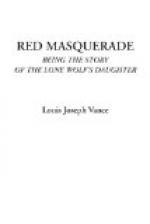PLEBEIAN AND PRINCE
The gentleman was not in the least bored who might have been and was seen on that wintry afternoon in Nineteen hundred, lounging with one shoulder to a wall of the dingy salesroom and idly thumbing a catalogue of effects about to be put up at auction; but his insouciance was so unaffected that the inevitable innocent bystander might have been pardoned for perceiving in him a pitiable victim of the utterest ennui.
In point of fact, he was privately relishing life with enviable gusto. In those days he could and did: being alive was the most satisfying pastime he could imagine, or cared to, who was a thundering success in his own conceit and in fact as well; since all the world for whose regard he cared a twopenny-bit admired, respected, and esteemed him in his public status, and admired, respected, and feared him in his private capacity, and paid him heavy tribute to boot.
More than that, he was young, still very young indeed, barely beyond the threshold of his chosen career. To his eagerly exploring eye the future unrolled itself in the likeness of an endless scroll illuminated with adventures all piquant, picturesque, and profitable. With the happy assurance of lucky young impudence he figured the world to himself as his oyster; and if his method of helping himself to the succulent contents of its stubborn shell might have been thought questionable (as unquestionably it was) he was no more conscious of a conscience to give him qualms than he was of pangs of indigestion. Whereas his digestive powers were superb....
This way of killing an empty afternoon, too, was much to his taste. The man adored auctions. To his mind a most delectable flavour of discreet scandal inhered in such collections of shabby properties from anonymous homes. Nothing so piqued his imagination as some well-worn piece of furniture—say an ancient escritoire with ink stains on its green baize writing-bed (dried life-blood of love letters long since dead!) and all its pigeon-holes and little drawers empty of everything but dust and the seductive smell of secrets; or a dressing-table whose bewildered mirror, to-day reflecting surroundings cold and strange, had once been quick and warm to the beauty of eyes brilliant with delight or blurred with tears; or perchance a bed....
And even aside from such stimuli to a lively and ingenious fancy, there was always the chance that one might pick up some priceless treasure at an auction sale, some rare work of art dim with desuetude and the disrespect of ignorance: jewellery of quaintest old-time artistry; a misprized bit of bronze; a book, it might be an overlooked copy of a first edition inscribed by some immortal author to a forgotten love; or even—if one were in rare luck—a picture, its pristine brilliance faded, the signature of the artist illegible beneath the grime of years, evidence of its origin perceptible only to the discerning eye—to such an eye, for instance, as Michael Lanyard boasted. For paintings were his passion.




